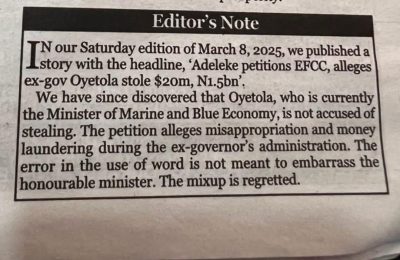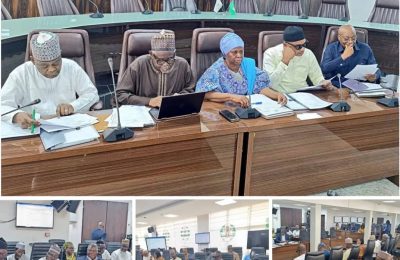
The Crude Oil Refineries Association of Nigeria (CORAN) has thrown its weight behind the Dangote Oil Refinery and Petrochemicals Limited amid allegations that local crude producers including the international oil corporations (IOCs) are actively obstructing the refinery’s operations by refusing to guarantee and provide crude supply.
Reacting to this worrying report as raised by the Dangote Refineries and published in several national newspapers, the Chairman of the Crude Oil Refineries Association of Nigeria (CORAN) Engr. Momoh Jimah Oyarekhua, while speaking on Channels Television Business Morning Show, on Tuesday, said that Dangote Refineries, as a member of CORAN, has expressed exactly the concerns of many other members who have been faced with serious operational dilemmas as a result of the hurdles on the part of obtaining crude oil locally for the operations of the various refineries in the country.

On the question of why the IOCs have frustrated the supply of crude to refineries, Oyarekhua said “I will take it from the angle of producers of crude rather than focusing on the IOCs alone. What we usually call IOCS are the international producers, but I do not think it is just about the international producers and operators in Nigeria, I think it’s more about the producers of crude in Nigeria that are perhaps frustrating the refineries in Nigeria from getting crude.
“In fact, we have been on this journey, I particularly have been on this journey of advocating for crude sales to local refineries and also where necessary for the modular refineries for crude to be sold to them in naira because most of our products are produced into the local market and income is actually in Naira and it is just commonsensical that if you sell product in naira you should be able to get your feedstock in naira, mostly when that feedstock is produced in naira so that you don’t put pressure on the US dollar that is already scarce in the country”
“We have had several engagements with the NUPRC and all of that and it is clear that in the PIA Law, in section 109, there is DCSO which is supposed to be Domestic Crude Supply Obligation to support the local refineries and I think that law was specifically put there by legislators not to starve the refineries. But what we have seen is a huge and still resistance by the producers of crude in Nigeria. They will rather prefer to export crude abroad than to sell to local refineries”
He insisted that the cost of finished products would reduce drastically if local refining is encouraged, instead of importation of finished refined products that do not even meet quality standards “We all saw that when Dangote came on stream, diesel dropped from NGN1’600 to about NGN1’200, and as we speak today, from our refineries, we are even selling less that NGN1’100. This is to tell you how far producing crude locally can support the economy and can support the people of Nigeria”
Stating that continuous support of local refiners will obviously bring down the prices of finished products, he noted that crude is not used for anything but for refining hence if there are functional refineries in the country it is difficult to understand why these refineries cannot be supported. Further stating that the government has to play its role to ensure that the laws it has passed are actually implemented.
Oyarekhua stated that as CORAN, the association is deeply saddened by the lack of support its members have been dealing with and the many unfriendly situations they have had to contend with over these past three to four years affirming that “as it stands today, with Dangote production, and production from the modular refineries, we are currently self-sufficient in the production of the primary products which are diesel, fuel oil, naphtha, and kerosene and Dangote is producing aviation fuel, so there is really no reason for the importation of products into the country”. He expressed dismay that marketers are doing everything to frustrate refineries.
He noted that Dangote Refineries, being one of its members, has rightly expressed the issues that the association has been dealing with and has engaged the government on these issues in the past two to three years stating further that it is hoped and expected that these difficulties will be removed, as soon as possible so that members can go into full production to meet installed capacity.
it will be recalled that earlier this week, Devakumar Edwin, Vice President of Oil and Gas at Dangote Industries Limited (DIL), accused the IOCs of inflating prices of local crude oil, and making it prohibitively expensive for the Dangote Refinery to purchase in Nigeria.
Speaking to a group of energy journalists during a one-day training session hosted by the Dangote Group, Edwin revealed that the Dangote Refinery has been compelled to import crude oil from as far away as the United States due to the excessive premiums demanded by IOCs in Nigeria.
He also expressed concern over the Nigerian Midstream and Downstream Petroleum Regulatory Authority’s (NMDPRA) continued issuance of import licenses to marketers, enabling them to bring contaminated refined products into Nigeria.
Edwin highlighted that out of the 25 licenses granted by the federal government to investors for constructing refineries, only the Dangote Refinery has met its obligations. He called on the Nigerian government to provide comprehensive support to the Dangote group, particularly regarding the Domestic Crude Supply Obligation (DCSO) as stipulated in the enabling statute.
“It is good to note that more than 3.5 billion liters, representing 90% of our production, have been exported since we started operations,” Edwin stated. “We urge the federal government and regulators to support us in creating jobs and prosperity for the nation.”
Despite efforts by the Nigerian Upstream Petroleum Regulatory Commission (NUPRC) to allocate crude oil to the refinery, Edwin alleged that foreign oil companies are deliberately frustrating these attempts. “The IOCs are purposefully and willfully impeding our efforts to purchase local crude,” he declared.
Recent meetings between the NUPRC, Nigerian refinery owners, and crude oil producers aimed to ensure compliance with DCSO requirements under Section 109(2) of the Petroleum Industry Act (PIA) have not yielded results.
However, the Dangote Refineries claimed that IOCs either falsely state that crude is unavailable or demand unreasonably high premiums, sometimes $6 above the market rate, forcing the refinery to reduce output and import crude at a higher cost.
The company asserted that IOCs are determined to keep Nigeria reliant on imported refined products while exporting crude oil to boost their home countries’ GDP. According to it, this strategy enriches foreign economies at Nigeria’s expense, perpetuating unemployment and poverty.
In the published report in the Thisday newspaper, Dangote refineries had condemned the NMDPRA for issuing licenses to traders importing ultra-high sulfur diesel from Russia, which poses significant health risks according to it “Russian ultra-high sulfur diesel is being dumped into the Nigerian market by vessels stationed near Togo, following the imposition of a price cap scheme by the US, EU, and UK on Russian petroleum products,” Edwin explained.
He noted that European nations like Belgium and the Netherlands have recently banned the export of such high-sulfur diesel to West Africa due to its carcinogenic effects. Yet, Nigeria continues to grant import permits for these hazardous products. Speaking further, the Dangote Refineries VP, Edwin, stressed the need for Nigeria to leverage its domestic refining capacity to avoid importing such contaminated fuels.
In that report Edwin also emphasized that the Dangote refinery has complied with international standards and ECOWAS regulations, enabling it to export aviation fuel and diesel to Europe and other parts of the world. Despite facing opposition from industry players, he said the refinery aims to support Nigeria’s economy by lowering fuel costs and ensuring environmental compliance.
CORAN also joined the Dangote Refineries to call on the National Assembly and the Executive Arm of government to intervene in the Oil & Gas sector to avert further unwholesome experiences faced by its members
CORAN backs Dangote Refinery, seeks support for improved local production
The Crude Oil Refineries Association of Nigeria (CORAN) has thrown its weight behind the Dangote Oil Refinery and Petrochemicals Limited amid allegations that local crude producers including the international oil corporations (IOCs) are actively obstructing the refinery’s operations by refusing to guarantee and provide crude supply.
Reacting to this worrying report as raised by the Dangote Refineries and published in several national newspapers, the Chairman of the Crude Oil Refineries Association of Nigeria (CORAN) Engr. Momoh Jimah Oyarekhua, while speaking on Channels Television Business Morning Show, on Tuesday, said that Dangote Refineries, as a member of CORAN, has expressed exactly the concerns of many other members who have been faced with serious operational dilemmas as a result of the hurdles on the part of obtaining crude oil locally for the operations of the various refineries in the country.
On the question of why the IOCs have frustrated the supply of crude to refineries, Oyarekhua said “I will take it from the angle of producers of crude rather than focusing on the IOCs alone. What we usually call IOCS are the international producers, but I do not think it is just about the international producers and operators in Nigeria, I think it’s more about the producers of crude in Nigeria that are perhaps frustrating the refineries in Nigeria from getting crude.
“In fact, we have been on this journey, I particularly have been on this journey of advocating for crude sales to local refineries and also where necessary for the modular refineries for crude to be sold to them in naira because most of our products are produced into the local market and income is actually in Naira and it is just commonsensical that if you sell product in naira you should be able to get your feedstock in naira, mostly when that feedstock is produced in naira so that you don’t put pressure on the US dollar that is already scarce in the country”
“We have had several engagements with the NUPRC and all of that and it is clear that in the PIA Law, in section 109, there is DCSO which is supposed to be Domestic Crude Supply Obligation to support the local refineries and I think that law was specifically put there by legislators not to starve the refineries. But what we have seen is a huge and still resistance by the producers of crude in Nigeria. They will rather prefer to export crude abroad than to sell to local refineries”
He insisted that the cost of finished products would reduce drastically if local refining is encouraged, instead of importation of finished refined products that do not even meet quality standards “We all saw that when Dangote came on stream, diesel dropped from NGN1’600 to about NGN1’200, and as we speak today, from our refineries, we are even selling less that NGN1’100. This is to tell you how far producing crude locally can support the economy and can support the people of Nigeria”
Stating that continuous support of local refiners will obviously bring down the prices of finished products, he noted that crude is not used for anything but for refining hence if there are functional refineries in the country it is difficult to understand why these refineries cannot be supported. Further stating that the government has to play its role to ensure that the laws it has passed are actually implemented.
Oyarekhua stated that as CORAN, the association is deeply saddened by the lack of support its members have been dealing with and the many unfriendly situations they have had to contend with over these past three to four years affirming that “as it stands today, with Dangote production, and production from the modular refineries, we are currently self-sufficient in the production of the primary products which are diesel, fuel oil, naphtha, and kerosene and Dangote is producing aviation fuel, so there is really no reason for the importation of products into the country”. He expressed dismay that marketers are doing everything to frustrate refineries.
He noted that Dangote Refineries, being one of its members, has rightly expressed the issues that the association has been dealing with and has engaged the government on these issues in the past two to three years stating further that it is hoped and expected that these difficulties will be removed, as soon as possible so that members can go into full production to meet installed capacity.
it will be recalled that earlier this week, Devakumar Edwin, Vice President of Oil and Gas at Dangote Industries Limited (DIL), accused the IOCs of inflating prices of local crude oil, and making it prohibitively expensive for the Dangote Refinery to purchase in Nigeria.
Speaking to a group of energy journalists during a one-day training session hosted by the Dangote Group, Edwin revealed that the Dangote Refinery has been compelled to import crude oil from as far away as the United States due to the excessive premiums demanded by IOCs in Nigeria.
He also expressed concern over the Nigerian Midstream and Downstream Petroleum Regulatory Authority’s (NMDPRA) continued issuance of import licenses to marketers, enabling them to bring contaminated refined products into Nigeria.
Edwin highlighted that out of the 25 licenses granted by the federal government to investors for constructing refineries, only the Dangote Refinery has met its obligations. He called on the Nigerian government to provide comprehensive support to the Dangote group, particularly regarding the Domestic Crude Supply Obligation (DCSO) as stipulated in the enabling statute.
“It is good to note that more than 3.5 billion liters, representing 90% of our production, have been exported since we started operations,” Edwin stated. “We urge the federal government and regulators to support us in creating jobs and prosperity for the nation.”
Despite efforts by the Nigerian Upstream Petroleum Regulatory Commission (NUPRC) to allocate crude oil to the refinery, Edwin alleged that foreign oil companies are deliberately frustrating these attempts. “The IOCs are purposefully and willfully impeding our efforts to purchase local crude,” he declared.
Recent meetings between the NUPRC, Nigerian refinery owners, and crude oil producers aimed to ensure compliance with DCSO requirements under Section 109(2) of the Petroleum Industry Act (PIA) have not yielded results.
However, the Dangote Refineries claimed that IOCs either falsely state that crude is unavailable or demand unreasonably high premiums, sometimes $6 above the market rate, forcing the refinery to reduce output and import crude at a higher cost.
The company asserted that IOCs are determined to keep Nigeria reliant on imported refined products while exporting crude oil to boost their home countries’ GDP. According to it, this strategy enriches foreign economies at Nigeria’s expense, perpetuating unemployment and poverty.
In the published report in the Thisday newspaper, Dangote refineries had condemned the NMDPRA for issuing licenses to traders importing ultra-high sulfur diesel from Russia, which poses significant health risks according to it “Russian ultra-high sulfur diesel is being dumped into the Nigerian market by vessels stationed near Togo, following the imposition of a price cap scheme by the US, EU, and UK on Russian petroleum products,” Edwin explained.
He noted that European nations like Belgium and the Netherlands have recently banned the export of such high-sulfur diesel to West Africa due to its carcinogenic effects. Yet, Nigeria continues to grant import permits for these hazardous products. Speaking further, the Dangote Refineries VP, Edwin, stressed the need for Nigeria to leverage its domestic refining capacity to avoid importing such contaminated fuels.
In that report Edwin also emphasized that the Dangote refinery has complied with international standards and ECOWAS regulations, enabling it to export aviation fuel and diesel to Europe and other parts of the world. Despite facing opposition from industry players, he said the refinery aims to support Nigeria’s economy by lowering fuel costs and ensuring environmental compliance.
CORAN also joined the Dangote Refineries to call on the National Assembly and the Executive Arm of government to intervene in the Oil & Gas sector to avert further unwholesome experiences faced by its members.
ALSO READ THESE TOP STORIES FROM NIGERIAN TRIBUNE








